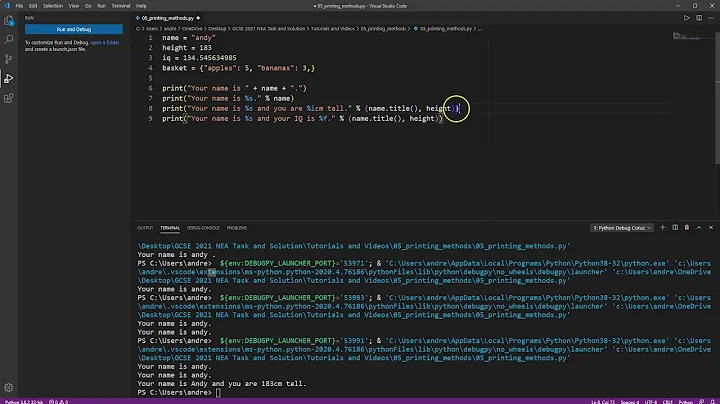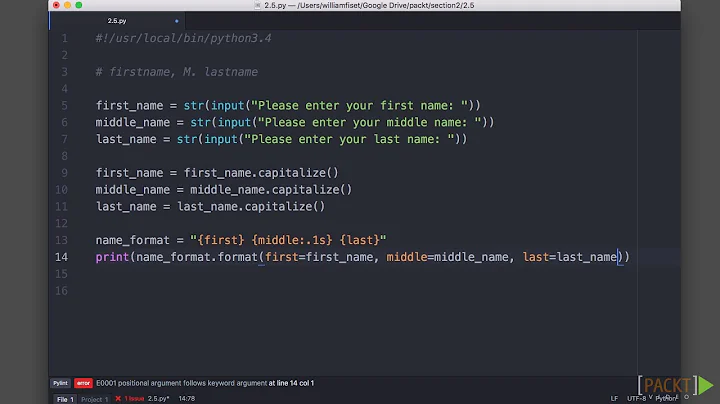How can you print a variable name in python?
Solution 1
If you insist, here is some horrible inspect-based solution.
import inspect, re
def varname(p):
for line in inspect.getframeinfo(inspect.currentframe().f_back)[3]:
m = re.search(r'\bvarname\s*\(\s*([A-Za-z_][A-Za-z0-9_]*)\s*\)', line)
if m:
return m.group(1)
if __name__ == '__main__':
spam = 42
print varname(spam)
I hope it will inspire you to reevaluate the problem you have and look for another approach.
Solution 2
To answer your original question:
def namestr(obj, namespace):
return [name for name in namespace if namespace[name] is obj]
Example:
>>> a = 'some var'
>>> namestr(a, globals())
['a']
As @rbright already pointed out whatever you do there are probably better ways to do it.
Solution 3
If you are trying to do this, it means you are doing something wrong. Consider using a dict instead.
def show_val(vals, name):
print "Name:", name, "val:", vals[name]
vals = {'a': 1, 'b': 2}
show_val(vals, 'b')
Output:
Name: b val: 2
Solution 4
You can't, as there are no variables in Python but only names.
For example:
> a = [1,2,3]
> b = a
> a is b
True
Which of those two is now the correct variable? There's no difference between a and b.
There's been a similar question before.
Solution 5
Rather than ask for details to a specific solution, I recommend describing the problem you face; I think you'll get better answers. I say this since there's almost certainly a better way to do whatever it is you're trying to do. Accessing variable names in this way is not commonly needed to solve problems in any language.
That said, all of your variable names are already in dictionaries which are accessible through the built-in functions locals and globals. Use the correct one for the scope you are inspecting.
One of the few common idioms for inspecting these dictionaries is for easy string interpolation:
>>> first = 'John'
>>> last = 'Doe'
>>> print '%(first)s %(last)s' % globals()
John Doe
This sort of thing tends to be a bit more readable than the alternatives even though it requires inspecting variables by name.
Related videos on Youtube
physicsmichael
Particle physics in my rear view mirror; data science in my headlights. My mother tongue is python, but I used C++ often while I was stuck/blessed with ROOT in physics. I dabble in Tex, Arduino, Raspi, bash, cluster computing, and more!
Updated on July 08, 2022Comments
-
physicsmichael almost 2 years
Say I have a variable named
choiceit is equal to 2. How would I access the name of the variable? Something equivalent toIn [53]: namestr(choice) Out[53]: 'choice'for use in making a dictionary. There's a good way to do this and I'm just missing it.
EDIT:
The reason to do this is thus. I am running some data analysis stuff where I call the program with multiple parameters that I would like to tweak, or not tweak, at runtime. I read in the parameters I used in the last run from a .config file formated as
filename no_sig_resonance.dat mass_peak 700 choice 1,2,3When prompted for values, the previously used is displayed and an empty string input will use the previously used value.
My question comes about because when it comes to writing the dictionary that these values have been scanned into. If a parameter is needed I run
get_paramwhich accesses the file and finds the parameter.I think I will avoid the problem all together by reading the .
configfile once and producing a dictionary from that. I avoided that originally for... reasons I no longer remember. Perfect situation to update my code!-
rtphokie over 4 yearsThere is little worse on Stack Overflow than people questioning the existence of a question itself.
-
sdaaualso related: stackoverflow.com/questions/932818/…
-
-
Kenan Banks about 15 yearsThe difference between a and b is the name.
-
dF. about 15 yearsgs is right. a and b refer to the same object, so a function receiving this object has no way to know which name was used to refer to the object in the function call.
-
Kenan Banks about 15 yearsHe's kinda right, in that there is no way for you to write a function in Python to differentiate. Still, there's no reason there couldn't be a built-in function that accomplishes this.
-
physicsmichael about 15 yearsI want to try to and print 'first' and 'last', the values that I call the references, not what they are equal to.
-
Greg Hewgill about 15 yearsThis fails if there is more than one variable name with the same value.
-
Greg Hewgill about 15 yearsThis fails if there is more than one variable name referring to the same value.
-
jfs about 15 yearsdis.dis() returns some names (not always).
-
jfs about 15 yearsTherefore It is sometimes possible to distinguish between
aandbeven they're referring to the same object. Python scopes are static. Namespaces are dynamic. -
jfs about 15 years@Greg Hewgill: You might have noticed that
namestrreturns list. It is a hint that there could be more than one name. -
jfs about 15 yearsIt means that e.g. when a function returns there might be no local namespace of that function left but you still may inspect the function code object to find what names are used inside.
-
jfs about 15 yearsI'd say most integers don't share their representations.
-
physicsmichael about 15 yearsI like the flow of your answer code, but I may be working with integers that may be repeated several times in the code... sigh
-
user1066101 about 15 years+1: The original question is not sensible. It's a simple dictionary. Or -- perhaps -- use a different language.
-
B Bulfin about 15 yearskey = "choice"; print vals[key]
-
Piotr Dobrogost over 12 years@J.F.Sebastian I'd say most integers don't share their representations I'm pretty sure there is the same amount of each of these two kinds :) Both sets are countable.
-
jfs over 12 years@Piotr Dobrogost: "share their representions" refers to CPython optimization that caches small integers therefore one of the sets is not countable it is finite.
-
jfs over 11 yearsThere is related use case for
inspect.currentframe().f_back.f_locals -
yantrab over 11 years"There are no variables in Python" Silly misinformation. You mean, "variables in Python work differently than in C."
-
Jake about 10 yearsSometimes a night of debugging makes us do things we're not proud of.
-
 Enteleform about 8 yearsupvoted for literal LOL
Enteleform about 8 yearsupvoted for literal LOL -
 Waylon Walker almost 7 yearsI like this solution the best, but did not like how '_' or '_70' would also show up. Unless you are searching fro private objects this provides a bit cleaner output. ``` def var_name(obj, namespace=globals()): return [name for name in namespace if namespace[name] is obj and name[0] != '_'][0] ```
Waylon Walker almost 7 yearsI like this solution the best, but did not like how '_' or '_70' would also show up. Unless you are searching fro private objects this provides a bit cleaner output. ``` def var_name(obj, namespace=globals()): return [name for name in namespace if namespace[name] is obj and name[0] != '_'][0] ``` -
M. Lautaro over 4 yearsI like how Jake's comment comes 5 years after the question and yet it still has 70+ up votes of people that, like me, reluctantly searched how to do this shameless thing in a moment of desperation







